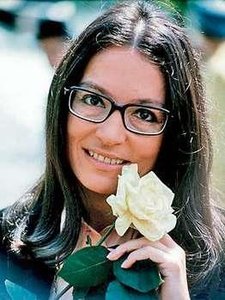
White roses
bloom again
 |
White roses bloom again |
Nana sang about daisies, lilies of the valley, violets, carnations. Roses are her fetish flowers thanks to the famous song "The white rose of Athens". Its melody was originaly created in Greece but destined for the German public. Its adaptation was a huge success and confirmed the beginning of a great international career. Here is its story.
DOCUMENTARY FILM With the success of the film "Never on Sunday", released in 1960, Greece is in fashion. People like Bouzouki and learn how to dance Sirtaki. A lot of visitors from abroad go off to explore this country, like the German film director Wolfgang Müller-Sehn who decides to realize a TV film. In order to show Greece in its greatest diversity, he shoots pictures of the mountains, the islands, the archaeological sites as well as the capital city. For the music and the orchestration of the soundtrack, he appeals to the most requested composer of the moment, Manos Hadjidakis. Nana, his accredited singer, records five songs whose texts are written by the poet Nikos Gatsos. There are "Ki' an tha dispasis jia nero", "San sfirixis tris fores", "Athina", "To pelago ine vathi" and "Tora pou pas stin xenitia". Recordings take place in October and in November of the same year. |
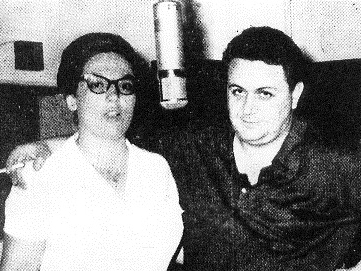 |
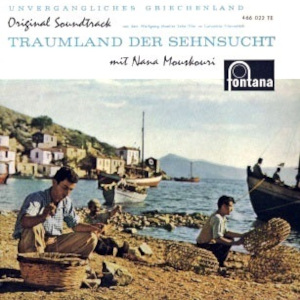 |
In June 1961, the documentary "Traumland der Sehnsucht" (Greece, Dreamland of Desire) is presented at the Berlin Film Festival and wins a Silver Bear. As Hadjidakis doesn’t want to travel, Nana decides to get there on her own. She remembers having felt intimidated, even disturbed, during this first stay in Germany. The only image she has of German people then is the one of the soldiers who occupied her country. So despite the honor given to her by the representatives during the official reception, Nana cannot help thinking about the suffering inflicted by those men to her compatriots. |
IN GERMAN Nikos Gatsos, her lyric writer and friend, helps her to forgive and encourages her to accept their offer to record in their language the two main movie themes. During the following weeks, Nana flies back to Berlin. She meets up with Ernst Verch, the producer of this project, who appeals to those who work with the greatest singers. For her, the conductor Heinz Alisch remade the arrrangements and the lyric writer Hans Bradtke gave a new meaning to the texts. During hours, Nana learns the songs and improves her accent. Then, she goes to Hansa-Studio in Grand Hotel Esplanade to make the recordings. This studio is located near Postdamer Platz and has the characteristic of being built with the ruins of an old bombarded palace and the cellars of the basement and its corridors are used as natural echo. |
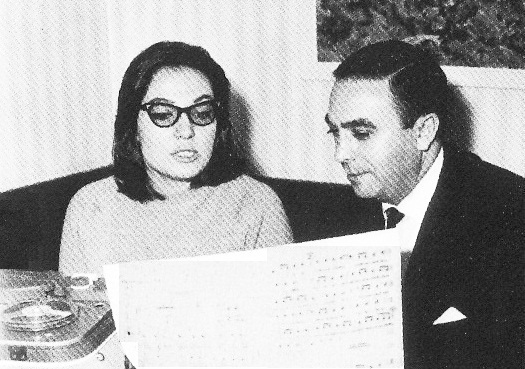 |
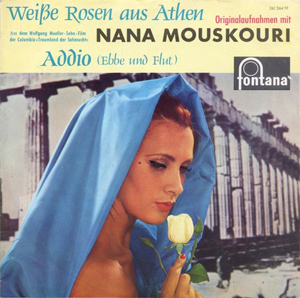 |
The final product allows to notice the transformations that have been done. So "Athina" (Athens) which is a tribute to the greek capital is called "Addio - Ebbe und Flut" (Farewell - Tide) and has to see with nostalgia. "San sfirixis tris fores" (If you whistle three times), a refrain introduced by a chorus, announcing a boat departure, becomes "Weiße Rosen aus Athen" (White roses of Athens), who are the witnesses of a Love. On the cover, features a young woman in front of the Parthenon holding a rose in her hand. On the back cover, Nana is described like the film title "Die Stimme der Sehnsucht" (The voice of nostalgia). |
On August 5 of the same year, the single enters the Hit Parades. It remains there during 38 weeks. As the sales continue to climb, the release of the second German single is delayed. Satisfied with its sales, the records company decides to offer a free stay in Athens to the 500,000th buyer; a young lady living in the suburbs of Berlin. Nana will be her guide. On February 20, 1962, in Munich, she receives a gold record for one million sold copies. The month after, Luxembourg gives her the Silver Lion as being the most popular radio singer of RTL station. That is of course mainly thanks to this song. |
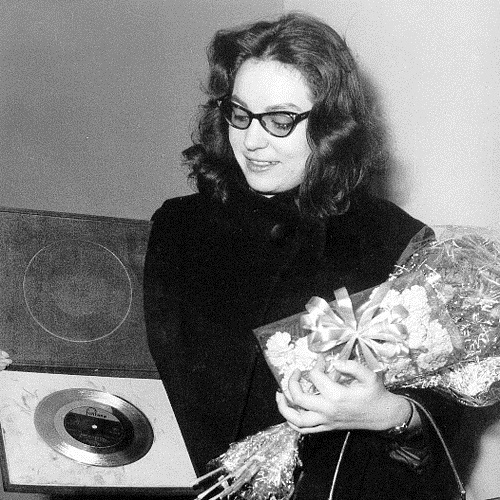 |
IN SEVERAL LANGUAGES
In the meantime, Nana recorded the song in French "Roses blanches de Corfou" and in English "The white rose of Athens". There will be also the Italian version "Rosa d'Atene". In French, Corfu was rather used than Athens because of the rhythm. In English and in Italian, the rose is mentioned in the singular form.
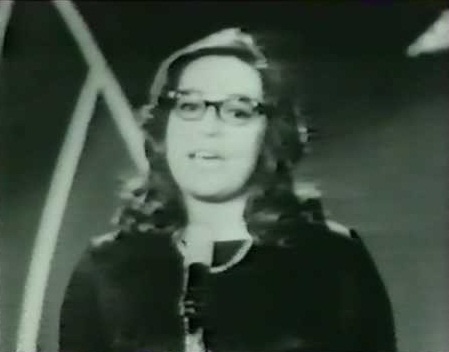 |
In her biographies, Nana confirms having recorded the song in Dutch and in Spanish. But on which discs do we find them? At the Grand Gala du disque in Scheveningen, she sings the Greek version. The Dutch public knew "Witte Rozen Uit Athene", but recorded by Mieke Telkamp and Mary Servaes, two of their more famous singers. In Spain, her compatriot Alekos Pantas presented "Rosas blancas" with the arrangements of the original composition. It is important to note that on Nana's records, the title is often mentioned in Spanish whereas it be sung in French, English or Italian. (However, in German, she will have refreshed her song by recording it with five different orchestras.) |
INTERNATIONAL SUCCESS & RE-RECORDINGS During her long career, Nana had many other big hits translated in various languages. But the single "Weiße Rosen aus Athen" remains her most important pressing in the same country. Furthermore, the success of that recording continued during many years if we consider all the albums sold because of that title, without counting all Internet downloadings. Moreover, a compilation of her first German songs originaly published in Holland in 1967, came out in several countries with the English title "White rose of Athens". In Australia, in particular, they took pleasure from releasing it with differents covers and labels. |
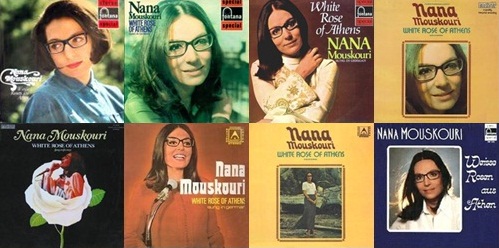 |
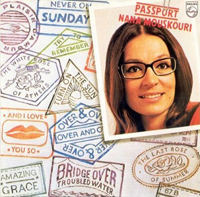 |
In 1968, during her variety programs series for the BBC, Nana decides to cover it with her band, The Athenians. She also records a new version in English, French and German with a verse. While adding it again to her repertoire, Nana contributed to make it discover in countries where it’s not necessarily the song that made herself known. Furthermore, in 1976, the song gains popularity with "Passport", a collection of her greatest hits inspired by the title. On this cover, titles appear as stamps with a photograph of Nana held by a paper clip. At the same time, in Germany, in Austria and in England, the song is re-released on 45 rpm. |
As it is a song that she is identified with, its success continues. In English-speaking countries, in particular, it is not uncommon that it starts several of her compilations. And over the decades, Nana has recorded "Weiße Rosen aus Athen" with six different orchestras. In 1987, one of these versions appears in Italian. As Nana claimed to have redone it in Spanish and Portuguese, there is enough to revive the hope of one day finding these recordings among her many unreleased tracks! Then, in 2012, more than ever, white roses bloom again; Nana goes on tour again in Germany, Austria and Switzerland to commemorate the 50th anniversary of this signature song. For Nana, this meeting is an opportunity to return to the stage after a four-year absence and to thank the first audience to whom she owes the disc consecration. Her daughter Lénou accompanies her. She sings alone and in duet with her mother.
PASSPORT In addition to marking her debut outside her country, the song "The white rose of Athens" has become an essential in her concerts. Each time, she interprets it to please her audience and recalls that it has been for her like a passport to make career worldwide. Many undoubtedly remember that during years, in every concert, Nana used to hang to her microphone the first rose offered by her fans. |
 |
ITS STORY
The white roses of Athens or of Corfu is a song that has its story and that survived for decades. This flower, a symbol of her origins, brought her luck throughout her career. Even in some countries, like Australia and England, admirers cultivate roses that carry Nana’s name.